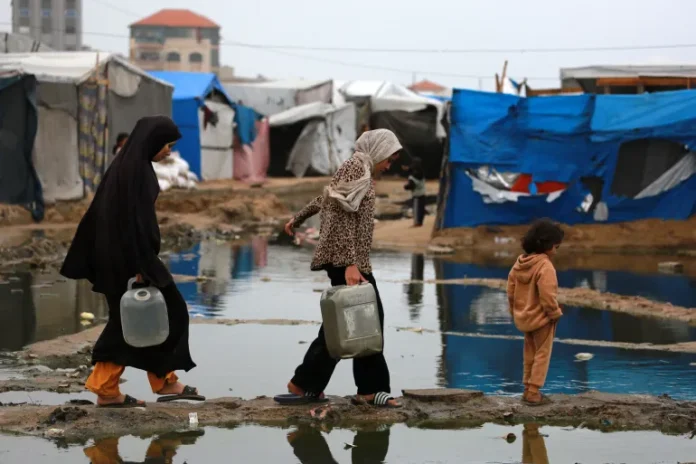Israel’s restriction of Gaza’s water supply to below minimum essential levels amounts to an act of genocide and extermination as a crime against humanity, a report by international human rights organisation Human Rights Watch (HRW) has claimed.
Israel committing “acts of genocide” by cutting off water in Gaza, HRW says
After investigating Israeli attacks on Gaza’s water infrastructure during the 14-month war, HRW accused Israeli forces of deliberately acting to drastically reduce the availability of clean water, forcing the population to use contaminated sources, which in turn led to an outbreak of deadly diseases, especially among children.
Israel’s actions have resulted in the deaths of many thousands of Palestinians and constitute an act of genocide, HRW claims. The organisation cites statements by ruling coalition ministers that Gaza’s water supply will be cut off as evidence of intent.
The 184-page report, “Extermination and Acts of Genocide,” comes after another human rights organisation, Amnesty International, published a report this month that also concludes that Israel is committing genocide in Gaza.
Earlier this year, the UN International Court of Justice issued preliminary rulings that Israel must halt the offensive and take immediate action to prevent genocide. Israel denies accusations of committing genocide or crimes against humanity in Gaza.
HRW’s accusations are not as extensive as Amnesty’s and focus specifically on Gaza’s water supply, but the organisation says the evidence that Israel has used access to water as a weapon against the Palestinian population as a whole is irrefutable. Lama Fakih, director of HRW’s Middle East and North Africa division, said:
“Human Rights Watch finds that these Israeli policies have amounted to the crime against humanity of extermination and acts of genocide.”
There have been about 670,000 cases of acute watery diarrhoea since the war began and more than 132,000 cases of jaundice, a sign of hepatitis. Childhood illnesses, which can usually be cured, have also become much more deadly because of the destruction of Gaza’s hospitals.
Most of Gaza’s drinking water came from three pipelines controlled by the Israeli water authority and desalination plants.
These pipelines were shut down at the beginning of the war and only partially restored. The United Arab Emirates built a water pipeline across the border with Egypt in February, but this supply was cut off due to damage to the pipeline during IDF attacks on Rafah.
Gaza’s three main desalination plants shut down shortly after the war began and only partially resumed operation after Israel allowed the UN and humanitarian organisations to import a limited amount of fuel.
Satellite images examined by HRW showed that solar panels powering four of Gaza’s six wastewater treatment plants were destroyed by Israeli military bulldozers – in northern Gaza, at al-Bureij camp and at the Sheikh Edjlin plants in central Gaza and Khan Younis in the south.
Satellite imagery also showed that 11 of Gaza’s 54 water reservoirs were completely or largely destroyed, while 20 others showed signs of damage.
Gaza mediators intensify ceasefire efforts, Israeli strikes kill 20
The US, joined by Arab mediators, has been trying to broker a deal between Israel and Hamas to end the 14-month war in the Gaza Strip, where medics said Israeli strikes killed at least 20 Palestinians on Wednesday.
A Palestinian official close to the talks said on Wednesday that mediators had narrowed differences on most points of the agreement. He said Israel had put forward conditions that Hamas rejected, but did not elaborate.
Sources close to the talks in Cairo, the Egyptian capital, said on Tuesday that a cease-fire and the release of hostages held in Gaza in exchange for Palestinian prisoners held by Israel could be signed in the coming days.
Medics said an Israeli airstrike killed at least 10 people in a house in the northern city of Beit Lahia, while six people were killed in separate airstrikes in Gaza City, Nuseirat camp in the central regions and Rafah near the Egyptian border.
